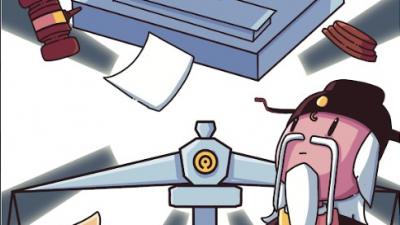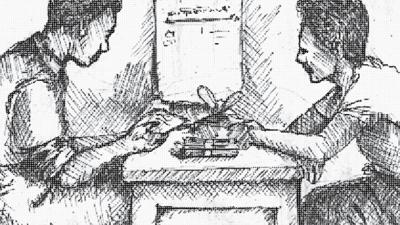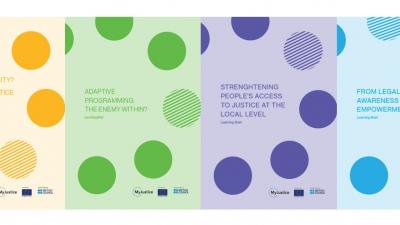-
"ပြစ်မှုကျူးလွန်တယ်လို့ စွပ်စွဲခဲရသူတိုင်းမှာ တခြားသော တရားရုံးတက်ရသူများနဲ့အတူ တန်းတူအခွင့်အရေးရှိရပါတယ်။ အပြစ်မရှိတဲ့သူ၊ အပြစ်ကျုးလွန်တယ်လို့ စွပ်စွဲခံရသူစတဲ့ တရားရုံးတက်ကြရသူအားလုံးကို တရားခွင်မှာ...
Know Your Rights: Mediation, Fair Trials and SGBV
"ပြစ်မှုကျူးလွန်တယ်လို့ စွပ်စွဲခဲရသူတိုင်းမှာ တခြားသော တရားရုံးတက်ရသူများနဲ့အတူ တန်းတူအခွင့်အရေးရှိရပါတယ်။ အပြစ်မရှိတဲ့သူ၊ အပြစ်ကျုးလွန်တယ်လို့ စွပ်စွဲခံရသူစတဲ့ တရားရုံးတက်ကြရသူအားလုံးကို တရားခွင်မှာ တန်းတူမျှတစွာ ဆက်ဆံကြရပါတယ်။ ဆိုလိုတာကတော့ လူတိုင်းက တရားမျှတမှုနဲ့ ဥပဒေရဲ့ အကာအကွယ်ကို ရပိုင်ခွင့်ရှိပါတယ်။ ထိုကဲ့သို့သော ရပိုင်ခွင့် အခွင့်အရေးများကို နားလည်ထားဖို့အတွက် ယခုလက်စွဲစာတမ်းမှ ရည်ရွယ်ပါတယ်။"
-
"The MyJustice report Personal Debt as a Justice Issue in Myanmar, based on a qualitative analysis of 124 interviews conducted in 2022 in Mandalay, Rakhine and Mon states, tracks personal experiences...
Personal debt as a justice issue in Myanmar
"The MyJustice report Personal Debt as a Justice Issue in Myanmar, based on a qualitative analysis of 124 interviews conducted in 2022 in Mandalay, Rakhine and Mon states, tracks personal experiences of debt disputes and how these have changed with the economic crisis and the disintegration of formal state authority across Myanmar. The report explores motives for, and sources of, borrowing, gender dimensions of debt, and the range of formal and informal remedies available when debt disputes happen. It illustrates a mounting personal debt crisis, as well as indications that this may precipitate the long-term erosion of trust and social capital, and an increase in the precarity of the position of women. Finally, the report recommends a range of short-term measures to help communities resolve debt disputes in the absence of formal institutions, as well as options for long term reform."
-
In a constantly evolving operational context, learning and reflection are key to MyJustice’s approach in promoting access to justice. Based on lessons learned from the heart of the programme,...
The Learning Briefs
In a constantly evolving operational context, learning and reflection are key to MyJustice’s approach in promoting access to justice. Based on lessons learned from the heart of the programme, MyJustice has shifted and adapted its approach whenever required. Innovation and an ability to be flexible has ensured that as a programme we truly respond to on-the-ground needs. Between July and December 2019, the team spent time reflecting on lessons learnt as well as their personal journeys in implementing a large access to justice programme in Myanmar for over four years since 2015. These reflections have resulted in several learning briefs and blogs. Covering topics such as the challenge of measuring behaviour change, building trust within, the experience of managing an adaptive programme, the leap from legal awareness to empowerment, the use of popular media to widen understandings of justice and rights and others, team members have shared both technical and practical challenges and solutions.
The learning briefs;
-
Women’s experiences, roles and influence in Community Based Dispute Resolution and Mediation in Myanmar
MyJustice’s partner, Mercy Corps, implements programmes to strengthen the mediation skills of civil society leaders, religious leaders, ethnic leaders and government officials and has recognised that, despite progress over the last five years, understanding of women’s experiences, roles and influence in CBDRM has been limited and an improved understanding will help adapt their programmes to ensure fair outcomes for all women and men. The overall objective of this study is to contribute to the evidence base on gender and CBDRM in Myanmar, so that women’s experiences and perceptions, and a better understanding of women’s roles and influence, can better inform programme design and implementation.
-
Gendered Aspects of Land Registration in Myanmar – Making Land Documentation work for Women
In 2018-19, MyJustice’s partner Norwegian Refugee Council (NRC) prepared four policy briefs analysing the potential role Collaborative Dispute Resolution may play in Myanmar in promoting access to justice and participation in the peace process for vulnerable communities. The policy briefs were drafted in the context of improving access to justice through community-based dispute resolution (CBDR) for Housing, Land and Property disputes in Myanmar.
-
Parallel land Governance Structures and their Impact on Conflict-Affected Communities and the Peace Process in South East Myanmar
In 2018-19, MyJustice’s partner Norwegian Refugee Council (NRC) prepared four policy briefs analysing the potential role Collaborative Dispute Resolution may play in Myanmar in promoting access to justice and participation in the peace process for vulnerable communities. The policy briefs were drafted in the context of improving access to justice through community-based dispute resolution (CBDR) for Housing, Land and Property disputes in Myanmar.
-
In 2018-19, MyJustice’s partner Norwegian Refugee Council (NRC) prepared four policy briefs analysing the potential role Collaborative Dispute Resolution may play in Myanmar in promoting access to...
Improving Property Rights through Community-Based Dispute Resolution in Myanmar
In 2018-19, MyJustice’s partner Norwegian Refugee Council (NRC) prepared four policy briefs analysing the potential role Collaborative Dispute Resolution may play in Myanmar in promoting access to justice and participation in the peace process for vulnerable communities. The policy briefs were drafted in the context of improving access to justice through community-based dispute resolution (CBDR) for Housing, Land and Property disputes in Myanmar.
-
In 2018-19, MyJustice’s partner Norwegian Refugee Council (NRC) prepared four policy briefs analysing the potential role Collaborative Dispute Resolution may play in Myanmar in promoting access to...
What is CDR and Why It Could Help Improve Access to Justice in Myanmar
In 2018-19, MyJustice’s partner Norwegian Refugee Council (NRC) prepared four policy briefs analysing the potential role Collaborative Dispute Resolution may play in Myanmar in promoting access to justice and participation in the peace process for vulnerable communities. The policy briefs were drafted in the context of improving access to justice through community-based dispute resolution (CBDR) for Housing, Land and Property disputes in Myanmar.
-
Gendered Aspects of Land Registration in Myanmar – Making Land Documentation work for Women
In 2018-19, MyJustice’s partner Norwegian Refugee Council (NRC) prepared four policy briefs analysing the potential role Collaborative Dispute Resolution may play in Myanmar in promoting access to justice and participation in the peace process for vulnerable communities. The policy briefs were drafted in the context of improving access to justice through community-based dispute resolution (CBDR) for Housing, Land and Property disputes in Myanmar.
-
Parallel land Governance Structures and their Impact on Conflict-Affected Communities and the Peace Process in South East Myanmar
In 2018-19, MyJustice’s partner Norwegian Refugee Council (NRC) prepared four policy briefs analysing the potential role Collaborative Dispute Resolution may play in Myanmar in promoting access to justice and participation in the peace process for vulnerable communities. The policy briefs were drafted in the context of improving access to justice through community-based dispute resolution (CBDR) for Housing, Land and Property disputes in Myanmar.


